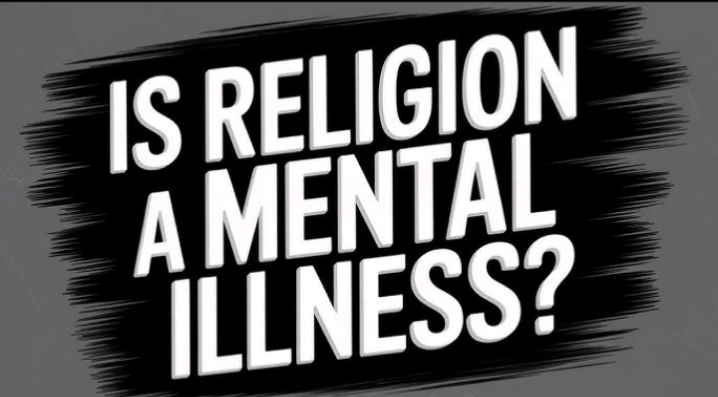Disclaimer
This article is intended to provoke intellectual dialogue and explore the controversial intersections of religion, psychology, and reason. It does not seek to ridicule faith but to question long-held assumptions about organized religion and belief in a deity. Reader discretion is advised.
Introduction

Few ideas are as sacred — or as polarizing — as belief in God. Across continents and cultures, religion has inspired extraordinary art, fostered community, and offered meaning to billions. Yet, beneath this vast legacy lies a difficult question:
What if religion isn’t divine inspiration — but a form of collective delusion?
A growing chorus of scientists, psychologists, philosophers, and even former believers are arguing that religion may be more aligned with mental conditioning than moral enlightenment. Some go further: not only is God a human invention, but the compulsion to believe in Him — despite lack of evidence — may reflect patterns of psychosis, paranoia, and mass neurosis.
When Belief Defies Logic
At the heart of most religions lies a paradox: unquestioning faith in an invisible, omnipotent, often vengeful being who speaks through ancient texts and punishes disbelief — sometimes with eternal torment.
In any other context, such a worldview might be called delusional. As neuroscientist Dr. Kathleen Taylor noted in her Oxford lecture:
“Religious belief could one day be classified as a mental illness.”
Her statement, though controversial, rests on simple psychological observations:
Hearing voices (prayer or divine messages)?
Seeing visions (miracles, saints)?
Believing one is chosen or favored by a cosmic force?
In psychiatry, these are red flags for schizophrenia, delusional disorder, or narcissistic psychosis. Yet when framed in religious terms, they are sanctified — not diagnosed.
God vs. the Human Brain
The brain is a meaning-making machine. When faced with fear, uncertainty, or death, it constructs stories to cope. Religion, according to many evolutionary psychologists, is one of those stories.
Dr. Andy Thomson, a psychiatrist and co-author of Why We Believe in God(s), argues that belief in supernatural beings is an accidental byproduct of evolution — much like phantom limbs or optical illusions.
“Religion exploits our cognitive wiring — agency detection, fear of death, and the desire for justice,” he explains. “It hijacks emotional circuits that evolved to help us survive.”
The result? Entire civilizations programmed to believe in unseen judges, eternal punishments, and divine plans — with no empirical evidence required.
Religion as Mass Psychosis?
To understand how deeply ingrained — and potentially dangerous — this belief can be, consider the following:
Children are taught that questioning God is sinful.
Wars are waged over whose version of God is “correct.”
People willingly die — or kill — in the name of religion.
From the Crusades to Boko Haram, from 9/11 to child sexual abuse cover-ups in churches, religion has often justified violence, suppressed science, and protected abusers — all while claiming moral authority.
If an individual claimed to speak to invisible beings, condemned others to hell, and urged followers to sacrifice themselves, society would deem them mentally ill.
Why does religion get a pass?
The God Delusion Argument
In his bestselling book The God Delusion, biologist Richard Dawkins likens belief in God to a “virus of the mind,” spread by repetition, indoctrination, and fear — not reason.
“Faith is belief in spite of, even perhaps because of, the lack of evidence,” Dawkins writes. “That is the very definition of irrationality.”
He further argues that religion infantilizes the mind, discourages critical thinking, and thrives on obedience — not inquiry.
The Psychological Toll of Belief
While many claim religion brings comfort, the opposite is often true:
Guilt over natural desires (sexuality, doubt).
Fear of hell or divine punishment.
Suppression of free thought, autonomy, and identity.
In extreme forms, religious belief becomes indistinguishable from mental illness — such as cases of “scrupulosity” (religious OCD) or “Jerusalem syndrome,” where visitors to holy sites experience psychotic episodes believing they are prophets or messiahs.
Faith vs. Freedom: The Need for Intellectual Liberation
None of this is to deny that religion can foster community or provide meaning. But so can art, science, literature, and shared human values — without invoking invisible overlords.
As philosopher Sam Harris puts it:
“Faith is nothing more than the license religious people give one another to keep believing when reasons fail.”
In an age of information, continuing to believe without evidence — and punishing those who don’t — may not only be irrational. It may be dangerous.
Conclusion: The Courage to Question
Religion persists because it preys on our deepest fears — of meaninglessness, of mortality, of chaos. But it also robs us of intellectual honesty, moral clarity, and in some cases, mental stability.
It’s time to ask:
Is belief in God a comforting myth — or a mass psychosis?
Should we continue to normalize religious indoctrination — or treat it as a societal pathology?
Until we are ready to face these questions with courage, humanity may remain enslaved — not to a deity, but to a delusion.